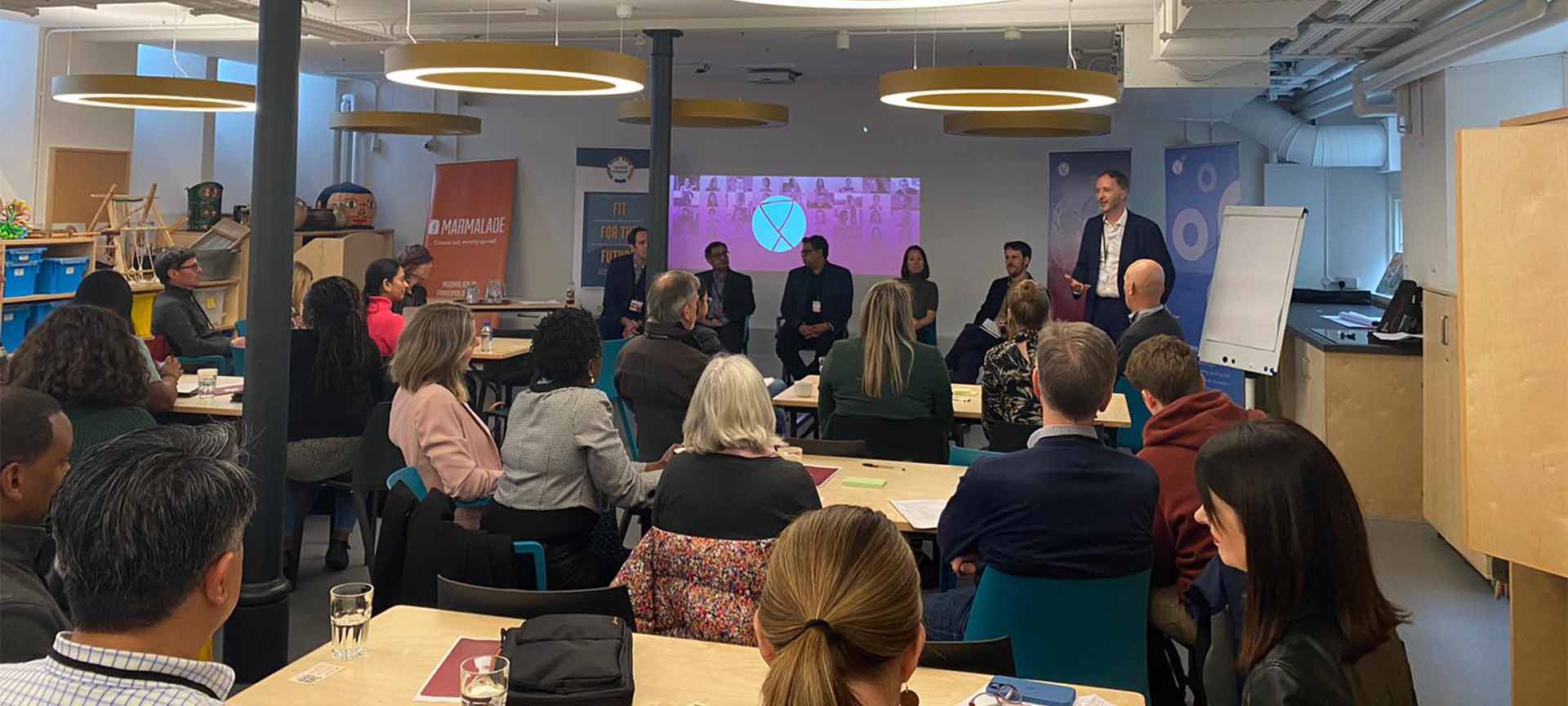As part of this year’s Skoll World Forum, Oxford HR was delighted to host an ecosystem event in collaboration with the Vitol Foundation, PEAS and STiR Education, on the crucial topic of founder-CEO transitions in purpose-led organisations. Bringing together an audience of founder and successor CEOs, senior leaders from founder-led organisations and funders interested in supporting grantee partners through these transitions, we enjoyed two highly insightful and informative panels interspersed with small group breakout discussions.
“Founder-CEO transitions are key moments in the lives of purpose-led organisations and it is invariably difficult for funders to raise the question of when and how and even if the subject has been addressed. Being a supportive voice and an interested ‘critical friend’ – particularly with an accompanying offer of financial support – can help kickstart the process and protect the future of the organisation and its work.”
John Collenette, CEO of Vitol Foundation
Our panellists comprised of founder and successor CEOs from PEAS, John Rendel & Laura Brown, founder and successor CEOs from STiR Education, Sharath Jeevan & Girish Menon, STiR Education’s board chair, Jo Owen, and Vitol Foundation’s CEO, John Collenette. The first panel focussed on the respective experiences and lessons learned by the founder and successor CEOs, whilst the second panel drew on perspectives around the role of the board in navigating a founder-CEO transition, and the role funders can play in supporting organisations at this critical moment. The feedback from the attendees underscored both the relevance of the experiences of panel members, as well as the honesty and frankness with which they shared their perspectives.
“I really enjoyed my panel discussion with Girish, Sharath and John about Founder-CEO transitions in for-purpose organizations. The room was packed with people for whom the subject is deeply personal which led to some fascinating insights (basically group therapy!).”
Laura Brown, CEO of PEAS
The panel discussions were wide ranging and covered many key dynamics of the founder transition in a short space of time, and these points were supplemented by the feedback from the group discussions which crowd sourced the wisdom of the room. We have noted below some of the key considerations raised:
- It’s never too early for a founder-CEO and board to discuss what an effective transition will look like. Board Chairs and/or founders who haven’t discussed it, should plan on doing so sooner rather than later and in a way that is sensitive to the founder’s inevitable anxiety that discussing succession might in some way precipitate it.
- The experience of the panellists strongly suggested that a clean break is the best exit strategy for a founder-CEO, and if there is a desire for their continued involvement (especially from the successor CEO) then a 12-24 month gap should be created to ensure there is space for the new CEO to fully step into their role.
- In the most successful transitions, founders will continue to be ambassadors and allies to the organisation, whilst fully stepping away from the operations and governance. An informal advisory relationship on institutional memory between the departed founder and the successor CEO can also be very beneficial.
- The successor CEO will likely need to bring a different skillset and style to the founder-CEO, taking the organisation from the start-up and consolidation phases into expansion and scale. Socialising the team and board to these new leadership requirements will be an important part of the recruitment process, and can be helped by ensuring an appropriate level of engagement and interaction for senior leaders and wider staff teams with prospective candidates.
- Founder-CEO transitions are emotionally charged events, and there is a need to recognise and create space for the sense of grief and loss that will be felt by the founder, the staff team, the board and external stakeholders. For transitions to be effective, it is really important for the incoming CEO to listen to the staff, board members and donor partners so that they understand and acknowledge the sense of loss that is felt (and the related anxiety) when a founder leaves.
- It’s important to give the space for the incoming CEO to really set their direction in a way that feels compelling and authentic to them. It’s important that they don’t come across as a “managerial” appointment and the new CEO is given a platform by the board to truly lead the organisation into its next chapter.
- In the context of initiatives to improve diversity, equity and inclusion, many organisations undergoing a founder-CEO transition have a strong commitment to appoint a candidate from under-represented regions or communities. Whilst this is an important consideration, if sufficient attention has not been given to organisational culture and its receptiveness to more diverse leadership, appointing panels may unwittingly set great candidates up to fail.
- Where an internal candidate succeeds the founder-CEO, some space should also be created to allow them to step out of their previous role and re-enter the organisation as CEO. For PEAS this happened fortuitously with a period of maternity leave, in other contexts an intentional break would be really valuable. An interim-CEO could play a valuable role in this regard.
- Regardless of whether there are strong internal candidates, an external search is a really valuable investment for founder-CEO transitions: in the event of an internal appointment it confirms the credibility of the chosen CEO to internal and external stakeholders alike.


- The recruitment process is an opportunity to create deep insight amongst prospective successor CEOs about the culture and context of the organisation. It is important to be very explicit about the board’s expectations for the specific phase in the evolution of the organisation, so that the message is clear to those considering the role, while also considering the alignment with their respective skill sets and experience.
- The most unsuccessful transition is the one that does not happen: the founder-CEO is naturally reluctant to hand over to someone else who may damage their legacy, whilst the board tends to be very risk averse: a CEO transition is the single most important and risky decision the board faces. The result is that both sides can quietly acquiesce in continuing with the founder-CEO for far too long. It takes a founder with courage and high self-awareness to step aside, and it takes a Chair with courage to step up and have a very difficult conversation with a founder-CEO. Both those qualities are in scarce supply.
- The transition should be concluded in as expedite a manner as possible, to avoid any hiatus in funding. It can be challenging for organisations to raise new funding in the shadow of a founder transition, and an early announcement of the founder’s departure can lead to a slow-down in funding, which then presents a difficult situation for the successor to inherit.
- Funders should be receptive to supporting the costs associated with a founder-CEO transition, but are rarely explicitly asked for their support. The costs involved can be significant, not just limited to the executive search process, but also encompassing coaching support to both the founder-CEO and the successor CEO, as well as the combined salaries of both during any handover period.
- Coaching can be really valuable in helping founders to have the time and space to think ambitiously about what they want to do next. This can also mitigate one of the factors that can hinder successful transitions – helping the founder to envisage life outside the organisation and decouple their identity from it.
- The founder’s mentality and spirit is often a critical success factor during the start-up and consolidation phases, and it is important for organisations to consider how they can seed this mentality across the organisation as well as finding elements of it in their successor CEO.
Our half-day workshop really only scratched the surface of many of these important discussion points, and we hope to continue this conversation at future in-person events and via online platforms to enable the widest possible sharing and learning on this topic.
“The conversations were rich and very stimulating. While organisations constantly go through leadership transitions, it is not often that we get to reflect on the process and share key insights. Thank you to Oxford HR for conceiving this opportunity and delivering an excellent event. We look forward to attending more such sessions to enhance our learning.”
Girish Menon, CEO of STiR Education
We would like to offer our heartfelt thanks to the panel members and guests who joined us in Oxford for the depth and candour of our discussions, as well as appreciating Marmalade and the Skoll Foundation for convening and creating the space for these important conversations.
—
At Oxford HR we are able to draw on our personal direct experience of Founder-CEO transitions, in addition to the support we have provided to many clients in appointing their successor CEOs. We have recently launched our own dedicated support service for founder transitions, and to find out more, please visit our Founder CEO page.



